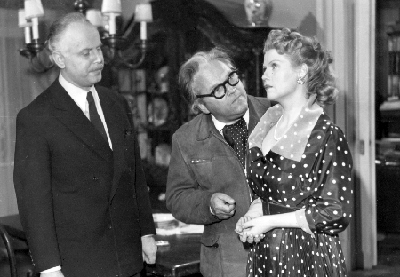By MORDECAI SPECKTOR
When one thinks of the Nazis and film, the name Leni Riefenstahl might come to mind. But the now largely unknown Veit Harlan was the most popular director in Germany during the Third Reich.
In a fascinating new documentary, Harlan: In the Shadow of Jud Süß (Jew Suss), director Felix Moeller looks at Harlan’s career and plumbs the controversies about the notorious director who enjoyed a privileged lifestyle while making films for Nazi propaganda minister Joseph Goebbels. Moeller tells Harlan’s story and its reverberations through the generations, in interviews with Harlan’s children, nieces and nephews, and grandchildren.
The film will be shown twice, 5:30 p.m. Tuesday, April 20 and 4:15 p.m. Wednesday, April 28, at the St. Anthony Main Theatre, as part of the Minneapolis-St. Paul International Film Festival (MSPIFF). The American Jewish World is sponsoring the screenings of Harlan.
The documentary’s title refers to Harlan’s diabolically anti-Semitic film, Jud Süß (1940), which film critics, and Harlan’s descendants, view as a cinematic tool of murder. Goebbels ordered that Nazi SS officers and concentration camp guards be made to view the film, a melodrama about a powerful and wicked Jewish character in 18th century Germany.
Harlan was twice tried for war crimes, and acquitted both times. He continued to make movies — which were dated and mediocre — in the 1950s. Harlan died in 1964, on the island of Capri, Italy.
Despite the vile, anti-Jewish tenor of Jud Süß, Harlan’s descendants express mixed views about whether the director was anti-Semitic or just single-minded in furthering his career under a demonic regime.

Moeller, who spoke to the AJW in early March, when he was in New York City for the film’s U.S. premiere, finds some credibility in the view of Thomas Harlan, the director’s eldest son, who was one of his father’s fiercest critics, but didn’t see him as a Nazi or an anti-Semite. Moeller says that, according to the younger Harlan, “you don’t have to be a genuine anti-Semite, it’s not necessary to make a film like [Jud Süß]; you can be an obsessive, career-driven opportunist… [Harlan] saw his big chance to be Goebbels’ top director… and put all his talent in it.”
The 99-minute documentary brings out intriguing bits of family history. Veit Harlan was briefly married in the early 1920s to a Jewish woman. Dora Gershon, Harlan’s first wife, was later murdered in Auschwitz. And two of Harlan’s daughters married Jews; both relationships were disastrous.
Finally, Harlan’s niece, Christiane Kubrick, was married to the late director Stanley Kubrick, who was Jewish. She tells a story about Kubrick’s apprehension about meeting Harlan and other family members in Germany. She says that her husband felt like “10 Jews” in the midst of his notorious in-laws — as if he were a character in a Woody Allen film.
Also, she reveals that Kubrick explored making a film loosely based on Harlan’s filmmaking career.
“He was not thinking of a biography of Veit Harlan,” Moeller says, regarding Kubrick’s unrealized project about film production in the Third Reich. “He was interested in the time and in the system, how was production working at the time; like [Viet Harlan’s nephew] Jan Harlan said, how did Goebbels interfere” with the filmmaker.

In another twist of interest to hard-core cinephiles, reviews of the documentary have noted that Harlan’s 1945 epic Kolberg was the basis for the film-within-a-film, Stolz der Nation, in Quentin Tarantino’s Oscar-nominated Inglourious Basterds.
Again, Riefenstahl is famous in America and globally, in recognition of her innovative aesthetic approach to filmmaking; but Harlan, in Moeller’s words, “was the real top filmmaker of the Nazi times. He had the largest audiences, he made the big films in the war.”
Moeller, who is the son of the famous German actress and director Margarethe von Trotta, is now working on a historical documentary about the Nazis’ exterminations camps in Poland — Sobibor, Belzec and Treblinka — which were part of Operation Reinhard.
***
The other MSPIFF film sponsored by the Jewish World is Alex Gibney’s Casino Jack and the United States of Money. The documentary traces the rise and fall of Republican macher Jack Abramoff. Regarded as the ultimate K Street lobbyist during the reign of Bush II, Abramoff was a guy who gave opportunism a bad name.
From a fraudulent casino ship deal in Florida to bilking Indian tribes in a brazen kickback scheme, Abramoff personifies the corrupting influence of money in this country’s political system. Gibney portrays Abramoff as a rank villain on Capitol Hill; but I have written about Abramoff’s crimes, in this paper and in The Circle, the Minneapolis-based American Indian monthly, and, trust me, he is even more odious than what the viewer sees in Casino Jack. For example, Abramoff told Indian tribal officials that, as a Jew, he understood the discrimination they had suffered; then he betrayed them and ripped them off for millions of dollars. Before Madoff raised the bar for gonifs, there was Abramoff.
Casino Jack and the United States of Money will be shown 4:30 p.m. Saturday, April 24 and 6:45 p.m. Wednesday, April 28.
***
For other films of Jewish interest, see the Minneapolis-St. Paul International Film Festival ad on Page 8 of this edition. All films will be screened at the St. Anthony Main Theatre, 115 Main St. S.E., Minneapolis. For a complete listing of films, go to: mspfilmfest.org.
(American Jewish World, 4.16.10)



















